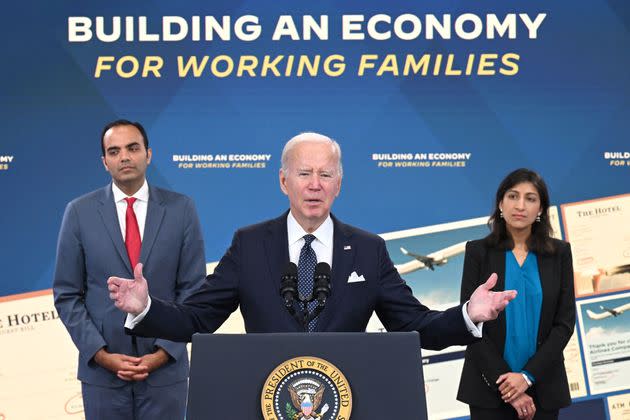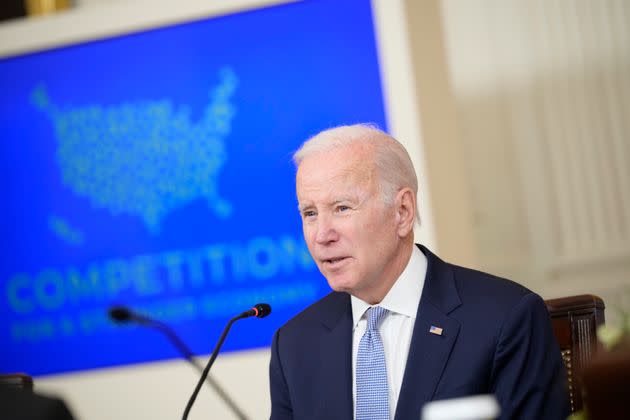Biden Announces New Rules To Tackle Big Corporate Consolidation

President Joe Biden announces a draft of new guidelines on corporate mergers in a proposed major change to the federal government's approach to antitrust enforcement.
President Joe Biden’s administration is set to roll out new guidelines Wednesday that determine when the federal government will challenge corporate mergers, a major step that has long been anticipated by antitrust advocates and is likely to set off a battle with big business.
Biden will announce the new guidelines, along with a handful of other new antitrust policies, at the fifth meeting of his White House Competition Council on Wednesday.
The Federal Trade Commission and the Department of Justice’s antitrust office are set to release a draft of the new guidelines, which aim to modernize how the agencies review mergers and acquisitions with the aim of reducing market concentration and anti-competitive behavior in key corporate sectors.
The new guidelines, spearheaded by FTC Chair Lina Khan and Assistant Attorney General Jonathan Kanter, are part of the Biden administration’s economic policy that would dismantle a 40-year reign of laissez-faire free-market economics established under President Ronald Reagan.
Antitrust enforcement agencies in the Reagan administration adopted a lax review standard that encouraged mergers and acquisitions and looked favorably on monopolies for promoting market efficiency. This standard gained bipartisan acceptance and has dominated antitrust enforcement ever since.
The new guidelines take into account the effects that mergers would have on workers, sellers, corporate power and markets while setting new rules for mergers involving digital platforms. They will likely usher in a new era of antitrust enforcement.
“As markets and commercial realities change, it is vital that we adapt our law enforcement tools to keep pace so that we can protect competition in a manner that reflects the intricacies of our modern economy,” Kanter said in a statement. “Simply put, competition today looks different than it did 50 ― or even 15 ― years ago.”
This major shift in policy comes after Biden appointed Khan and Kanter ― both noted antitrust hawks ― within months of his inauguration. He issued an executive order on competition policy that called for the rewrite of the merger guidelines and has since informed policy changes at nearly every federal agency.

President Joe Biden speaks at a meeting of his White House Competition Council on Feb. 1 in the East Room of the White House.
The last attempt to revise the merger guidelines occurred in 2020 during the Donald Trump administration. But the Biden administration, in efforts led by Khan and Kanter, soon scrapped those rules for failing to reflect accurate economic thinking and data, and they set about to create a fresh rewrite.
That process produced more than 5,000 public comments, far more than the 30-some comments from corporations that the agencies received during previous updates. The draft guidelines will be available for public comment for 60 days.
The merger guidelines aren’t the only new antitrust policies the administration announced on Wednesday. In addition, the Department of Housing and Urban Development announced plans to crack down on junk fees in the rental housing market.
In March, HUD Secretary Marcia Fudge wrote to leaders in the rental housing industry to push them to crack down on hidden and excessive fees , such as rental application fees and hidden charges for trash collection or other services that tenants may presume are built into the rent.
Three digital real estate platforms ― Zillow, Apartments.com and AffordableHousing.com ― now plan to include these often-hidden fees when they list prices on rental properties.
The U.S. Department of Agriculture also announced Wednesday that it has entered into a partnership with the attorneys general of 32 states and the District of Columbia to target anticompetitive behavior in food markets.
The partnership would allow cooperation in competition lawsuits that seek to reduce food prices, combat price gouging, increase food access and thwart anti-competitive behavior that threatens food supply chains.

 Yahoo News
Yahoo News 